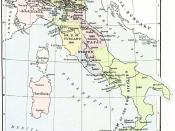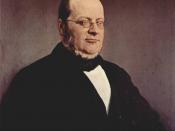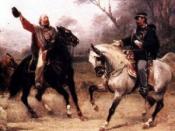The full Italian unification came about in 1871 but the unification came close to completion as far as ten years earlier in 1861. In 1861, only two Italian states remained unclaimed by Italy. Leading up to 1861, there were a number of factors, which prevented unification of Italian states, most importantly Austrian influence and their presence in the northern states and the lack of patriotism among the Italian people. Two key figures helped overcome these two main problems, Cavour the Piedmontese prime minister and Garibaldi, a follower of Mazzini's ideas who later became a hero of the Risorgimento.
Out of the two Cavour was the brains in the conception of a united Italy. At first, however, his main aim was to rid Austria from the northern states, an aim which also helped the Italian unification to come about. This aim was coupled with the wish to increase Piedmontese power and influence therefore unification never really entered Cavour's mind until later on.
In his quest to expel Austria from the north, Cavour realised that this would be impossible without foreign support as Piedmont was the only Italian state strong enough to stand up to Austrian rule. As Cavour used diplomatic and devious methods to achieve his goals, he met with the French king and promised to give him Nice and Savoy in return for his help. This was an important move that Cavour made to ensure a successful campaign against the Austrians but it was not the first. In 1854, Cavour supplied Britain and France with 15,000 troops in the Crimean war against Russia. The gratitude he gained from Britain and France was important in the growth of Piedmonts stature in Europe. One of Cavour's most important achievements, however, was at the Plombiers agreement where he worked out a way to...


